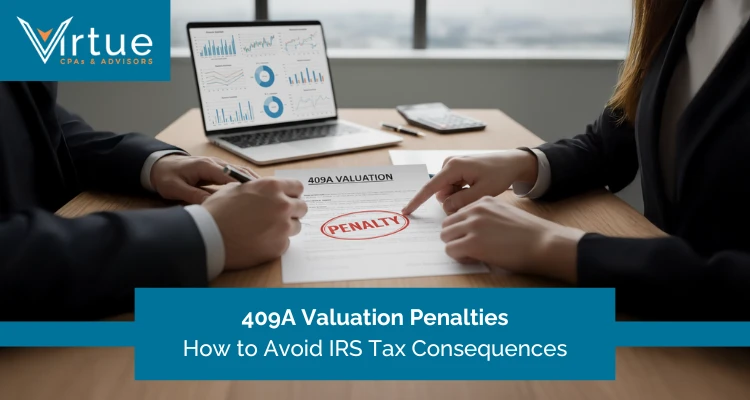A single 409A compliance mistake cost one startup $2.3 million in penalties and back taxes, illustrating the staggering financial risks startups face. Many underestimate the importance of 409A valuation compliance not just from a legal standpoint but in guarding against devastating tax consequences that may threaten their company’s growth, employee morale, and investor confidence.
Section 409A of the Internal Revenue Code (IRC) sets the rules startups must follow when pricing employee stock options to prevent inappropriate deferral and undervaluation schemes. Missing deadlines, utilizing inaccurate or outdated valuations, or neglecting to perform necessary valuation updates exposes companies and employees to heavy IRS penalties, including a 20% additional tax on the taxable amount of stock options.
What Happens When 409A Valuation Rules Are Violated?
Failure to maintain 409A-compliant valuations can lead to serious IRS penalties affecting both companies and their employees:
- Immediate inclusion of deferred stock option income in employees’ taxable income, even if the options are not exercised.
- A 20% additional penalty tax on all amounts deemed taxable due to improper valuation.
- Interest penalties on any unpaid taxes from previous years where the non-compliance occurred.
- Potential employer liabilities for failure to withhold payroll taxes or properly report income.
Penalties typically arise when stock options are priced below fair market value (FMV), which could be due to flawed valuations, failure to update valuations after material events, or other compliance oversights.
Recent IRS Enforcement Trends & Case Studies
IRS audits on 409A valuation compliance have intensified, particularly as more startups approach liquidity events such as mergers, acquisitions, or IPOs. The IRS scrutinizes valuations more closely, looking for undervaluation that could represent tax avoidance.
- In one notable case, a Silicon Valley startup was fined over $2 million after auditors identified valuation errors incorrectly pricing multiple stock option grants.
- Another company had to completely overhaul its stock option structure following an IRS audit, delaying growth plans and eroding investor trust.
Early and consistent compliance with proper valuations is the best way to avoid these costly scenarios.
When Should Your Startup Get a 409A Valuation?
The IRS requires a current and defensible 409A valuation before issuing stock options to employees or contractors. Beyond initial option grants, other key triggers necessitate obtaining or updating the valuation, including:
- New venture capital funding rounds (Seed, Series A, B, etc.) that alter company capital structure.
- Company mergers, acquisitions, or significant restructurings affecting valuation and equity distribution.
- Material changes in business operations, models, revenue streams, or market conditions.
- Product launches, strategic partnerships, or leadership changes substantially shift company value.
Failing to update valuations promptly after these milestones can lead to penalties even if prior valuations were compliant at issuance.
The 12-Month Safe Harbor Rule Explained
IRS regulations stipulate that a valuation is presumed reasonable if:
- Conducted by a qualified independent appraiser or valuation firm.
- Dated within 12 months of the stock option grant date.
- No material event affecting the company’s value has occurred between valuation date and option grant.
If any material event happens within this period, an updated valuation must be performed immediately to maintain compliance and safe harbor protection.
Common Material Events Requiring Valuation Updates
- Completion or closure of capital financing rounds.
- Signing of major strategic partnerships or securing substantial customer contracts.
- Change in executive leadership such as new CEO or CFO appointments.
- Launch or pivot of products that shift market positioning or revenue potential.
- Shifts in industry regulation or market environment impacting company valuation.
How to Identify a Qualified 409A Valuation Specialist
- Select an independent third-party valuation firm specializing in startups, with proven IRS compliance knowledge.
- Choose vendors with experience in your industry sector and company stage for nuanced and defensible valuations.
- Verify thorough and transparent methodologies aligned with accepted financial valuation standards and IRS safe harbor requirements.
- Ensure the provider delivers comprehensive documentation ready for IRS audit defense.
Documentation Requirements to Satisfy the IRS
To establish a defensible 409A valuation and withstand IRS scrutiny, companies must maintain detailed records:
- A formal 409A valuation report showing the approach used (e.g., Market, Income, Asset approaches), assumptions, financial inputs, and conclusions.
- Minutes from board meetings formally approving the valuation report and related stock option grants.
- Complete and up-to-date capitalization tables including equity ownership, option pools, and convertible securities.
- Copies of stock option award agreements and supporting contractual documents.
Retaining these documents for at least three to seven years is critical in case of an audit.
Creating a Proactive Valuation and Compliance Calendar
- Establish an internal compliance schedule aligned with funding rounds, corporate events, and the 12-month safe harbor expiration dates.
- Implement automated reminders to renew valuations ahead of expiration.
- Coordinate valuation updates closely with legal, finance, and HR teams to ensure timely execution for new grants or material events.
- Develop written policies defining what constitutes a material event necessitating valuation updates to standardize corporate practices.
The Top 5 409A Compliance Errors
- Relying on outdated valuations after new funding rounds or significant company changes.
- Granting stock options with strike prices set below fair market value.
- Self-prepared or DIY valuations without safe harbor documentation or expert rigor.
- Incomplete or missing board approval minutes and valuation documents.
- Missing or delaying the annual valuation update, voiding safe harbor protection.
Why DIY and Internal Valuations Often Fail IRS Scrutiny
Internally prepared valuations are typically disqualified because they lack:
- Necessary independence and external validation from qualified appraisers.
- Deep technical expertise in valuation methodologies and risk assessments.
- Comprehensive documentation suitable for IRS defense.
- Industry benchmarks and market data access necessary for accuracy.
This increases exposure to IRS penalties and audit challenges, making outsourced professional valuation services a wise investment.
Red Flags That Attract IRS Attention
- Consistently using the same valuation even after significant financial or structural changes.
- Valuations prepared by founders or internal finance staff without clear certification.
- Grant prices substantially below those used by professional investors or market transactions.
- Missing or unsigned valuation reports and incomplete board approvals.
Why Expert Guidance Is Essential
409A compliance requires expert knowledge of tax law, financial valuation, and startup lifecycles to:
- Ensure valuations are IRS-defensible and technically accurate.
- Provide complete audit-ready documentation and board approval packages.
- Monitor company events that may impact valuation status and trigger updates.
How Virtue CPAs Protect Your Business
Virtue CPAs bring startup-focused valuation experience combined with technology-enabled processes for efficiency and accuracy. They provide:
- End-to-end compliance management from initial valuations to ongoing monitoring and documentation.
- Customized advice balancing cost and compliance security.
- Support through IRS audits if needed, minimizing disruption and penalties.
The ROI of Professional 409A Management
Understanding Different Types of Equity Compensation Subject to 409A
Not just stock options but various equity compensation forms require valid 409A valuation, including:
- Common and preferred stock grants.
- Stock options and warrants.
- Restricted Stock Units (RSUs) and Restricted Stock Awards (RSAs).
- Phantom stock or other synthetic equity instruments.
Each type has specific tax treatment; ensuring proper valuation is crucial.
Effects of Bad Valuations on Employee Retention and Investors
Beyond IRS penalties, improper valuations can:
- Create unexpected tax liabilities that hurt employee morale and retention.
- Scare off investors during due diligence for funding rounds or exits.
- Result in costly re-pricing of options or legal disputes.
Understanding these business impacts reinforces the value of strict 409A compliance.
Final Thoughts & Next Steps
The financial and operational risks of 409A valuation mistakes are steep but fully avoidable with proactive, informed compliance. By understanding triggers, staying timely with valuation updates, adhering to safe harbor rules, and securing professional guidance from Virtue CPAs, startups protect their equity plans from costly tax penalties and maintain strong, trust-based relationships with employees and investors.
Don’t wait until you face an IRS audit, schedule your 409A compliance consultation with Virtue CPAs today. Secure your startup’s equity, avoid penalties, and plan confidently for a prosperous future.
Frequently Asked Questions

Jeet Chaudhary
Jeet Chaudhary serves as the Chief Operating Officer at Virtue CPAs, where he leads the firm’s Global Control Centre and oversees end-to-end operational excellence.






